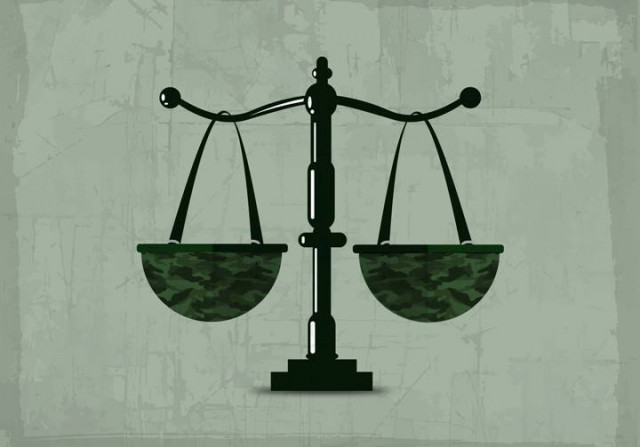Military courts revival wins NA nod
Barring PkMAP all parties vote in favour, JUI-F abstains

CREATIVE: AAMIR KHAN
All the parties, except for the government ally PkMAP and an independent MNA, voted in favour of the bill. The ruling party’s another ally, the JUI-F, opted to abstain from voting.
When counting was done through division of benches, 255 MNAs voted for the bill while four members – three of Mehmood Khan Achakzai’s PkMAP and an independent Jamshaid Dasti – voted against it.
This minuscule opposition, however, did not affect passage of the bill which required support of two-third members in the 342-strong house.
The house rejected through voice vote, amendments proposed in the bill by the JUI-F, the MQM and Dasti. The NA also passed the subsequent legislation – the Pakistan Army Act (Amendment) Bill, 2017.
Military courts back in sight as PPP budges
Both the bills – the 28th Amendment Bill, 2017 and Pakistan Army Act (Amendment) Bill – will now be sent to the Senate for a similar approval today (Wednesday) after which the president’s nod will turn them into acts.
Military courts – set up for two years for speedy trial of hardcore terrorists in the wake of Dec 2014 massacre of schoolchildren – ceased to function on expiry of their term on Jan 7, 2017.
Later, government held multiple sessions with political parties to build consensus on revival of the trail courts and after almost three months of hobnobbing the political parties with representation in the parliament agreed to revive the courts.
The MQM wanted the bill to have the same draft that was used for 21st amendment bill when these courts were initially set up. The JUI-F wanted to omit the term ‘sect’ and ‘religion’ as used in the 21st amendment and later carried also in the new draft.
The PPP, the biggest opposition party in both houses of the parliament, succeeded in getting included four new clauses. These clauses ensure that the terror accused is presented for remand within 24 hours along with a charge sheet; that he/she has right to hire a private counsel and that the law of evidence is applicable on him/her.
Military Courts: ‘JUI-F half-heartedly accepted govt’s decision’
PkMAP, a Pashtoon nationalist party from Balochistan had laid down five conditions, mostly non-related with the legislation, to support the bill. After a long period, the Leader of the House – Prime Minister Nawaz Sharif – attended the sitting of the National Assembly for around two hours.
The house also adopted a resolution to constitute a parliamentary committee on the national security. The committee to be headed by Speaker National Assembly will oversee the national security issues of the country.
The committee will monitor the process of transition from military courts to civil courts through criminal justice reforms besides reviewing, monitoring and overseeing expeditious implementation of the National Action Plan (NAP) against terrorism.
Earlier taking part in the discussion, Haji Ghulam Ahmad Bilour of the ANP supported the bill and said elimination of the terrorist mindset was imperative for eradication of terrorism from the country.
“Terrorism cannot be eliminated by the constitution of the military courts but it will end only by changing the mindset which encourages the terrorists to go on with their activities,” he said.
Ijaz-ul-Haq of PML-Z also supported the bill and said revival of the courts is in the interest of the country and not that of the security forces. He was of the view that military courts should continue to work till elimination of terrorism from the country.
Dr Nafisa Shah of the PPP said revival of the military courts undermined the jurisdiction of the judiciary besides negating the fundamental rights of the citizens. “Above all, by constituting the military courts we are also weakening the civilian supremacy,” she said.
Winding up the discussion, Finance Minister Ishaq Dar said after the expiry of the tenure of the military courts on January 7, the government decided to revive them with consensus of all the parliamentary parties.
He said fifteen meetings of parliamentary leaders and five meetings of the technical committee were held in this regard. He said it was agreed to revive the tenure of the military courts for next two years.
“The Parliamentary Committee on National Security that was constituted after the 2011 Abbottabad raid will also be revived through a resolution and it will oversee functioning of the military courts,” he said.
Law Minister Zahid Hamid said constitution of military courts through 21st constitutional amendment had yielded positive results in combating terrorism and therefore this new bill had been moved for reconstitution of the courts to continue with these special measures.
The MQM Iqbal Qadri introduced an amendment in the Pakistan Army (Amendment) Bill 2017 and 28th Amendment Bill and suggested replacing the word ‘using’ with ‘misusing.’ However, the amendment was opposed by the treasury benches.
Jamshed Dasti’s proposed that the cases of blasphemy should also be tried in the military courts. He also proposed to make financial terrorism a part of the bill. Naeema Khan of the JUI-F proposed removing word ‘misusing the name of religion or a sect’ but amendments of both Dast and Khan were rejected.



















COMMENTS
Comments are moderated and generally will be posted if they are on-topic and not abusive.
For more information, please see our Comments FAQ